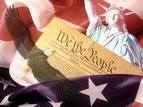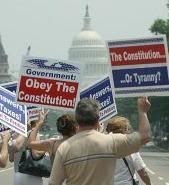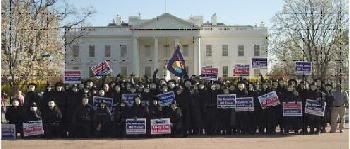FedGov admits no tax liability case law!!

Tax Attorney Confirms Article on W-4
* Larry Becraft, Jr.
Presently, I have an appeal in a criminal tax case pending before the Eleventh Circuit which raises the issue as to who is liable for the federal income tax.
The government filed its brief in this case and I was utterly amazed at the government's answer to my argument.
Due to the admission so made, I now realize that my argument is monumentally significant and I feel compelled to tell other attorneys involved in similar litigation.
I had expected that the government would respond with a lengthy, detailed argument showing that state citizens were taxed via some complicated manner that directly or indirectly so imposed the tax.
///////
But, when I received the government's brief, I found one page thereof that addressed my issue;.. After calling my argument frivolous, the U.S. attorney then stated as follows:
"The government is unable, therefore, to offer case authority for the universally accepted proposition that a citizen of the United States, working and residing in the United States, subject to federal law, earning wages, and responsible for filing an income tax return, is liable for taxation."
Click here to read more.












10 Comments:
Hi Larry,
I've heard your name over the years. I'm unable to view the link without joining. We're having a discussion of the Ed Brown case on thehighroad.org, legal/political forum. "Who's required to file" is a recurring question. I invite you to post this citation in the Ed Brown thread, it would advance the discussion tremendously.
Thanks and good luck!
Bob.
Me too, maybe Lone Lantern has a secret handshake!
http://home.hiwaay.net/~becraft/UNCERTAIN.html
The Schiff trial proved a DOJ attorney does not have to be smart as long as judge is a crook.
UNITED STATES TAX COURT WASHINGTON, D.C. 20217
NOTICE OF PROPOSED AMENDMENT TO RULES
Pursuant to section 7453 of the Internal Revenue Code as amended and Rule 1 of the Tax Court Rules of Practice and Procedure, the United States Tax Court hereby gives notice that it proposes the attached amendment to its Rules of Practice and Procedure and invites public comment thereon. Written comments must be received by November 13, 2006. Comments must be addressed to:
Robert R. Di Trolio Clerk of the Court U.S. Tax Court 400 Second St., N.W., Room 111 Washington, D.C. 20217
Absent further notice, the amendment will be effective as to small tax cases in which the petition was filed after November 27, 2006. The amendment shall have such effect on pending proceedings as the Court may order.
The proposed amendment and explanation are as follows.
Paragraph (b) of Rule 173 is deleted and replaced with the following.
RULE 173. PLEADINGS
(b) Answer: The Commissioner shall file an answer or shall move with respect to the petition within the periods specified in, and in accordance with the provisions of, Rule 36.
Explanation
Introduction
Section 7463 provides a simplified procedure for resolving tax disputes in small tax cases. When this provision was first enacted as part of the Tax Reform Act of 1969, the amount of deficiency or overpayment placed in dispute in a small tax case could not exceed $1,000. Congress has increased this jurisdictional amount for small tax cases several times. Most
recently, the Internal Revenue Service Restructuring and Reform Act of 1998 increased the amount to $50,000, effective July 22, 1998, and provided additional categories of small tax cases.
In certain instances, a small tax case proceeding may be discontinued; the case is then conducted under regular procedures. See section 7463(d). The conference committee report to the Internal Revenue Service Restructuring and Reform Act of 1998 states:
the conferees anticipate that the Tax Court will carefully consider (1) IRS objections to small case treatment, such as objections based upon the potential precedential value of the case, as well as (2) the financial impact on the taxpayer, including additional legal fees and costs, of not utilizing small case treatment. [H. Conf. Rept. 105-599, at 245 (1998), 1998-3 C.B. 747, 999.]
From the enactment of section 7463 in 1969, until May 1, 1979, pleadings requirements in small tax cases and regular cases were identical. Effective May 1, 1979, the Court amended former Rule 175(b) to generally eliminate the requirement that the Commissioner file answers in small tax cases. The note to this 1979 amendment states:
Par. (b) of this Rule is amended to change the existing requirement that the Commissioner file an answer to the petition in all small tax cases. Under the new provision, the general rule is that the Commissioner need not file an answer in such cases, unless there is matter on which he has the burden of proof, as, for example, where he relies on an affirmative defense or the determination of fraud on the part of the petitioner. However, even though not required to do so, the Commissioner may file an answer if he so desires.
The experience of the Court under its preexisting procedure has shown that the filing of answers in all small tax cases has not been helpful in the disposition of such cases and has resulted generally in merely calling for unnecessary additional paperwork, particularly in the light of the fact that most of these case are actually disposed of without trial. Furthermore, the Commissioner has assured the Court that, in the relatively small number of cases expected to be tried, he will file with the Court and serve upon
the petitioner an informative statement amplifying the matters in dispute that are to be adjudicated. [71 T.C. 1212.]
Current Rule 173(b) is identical to former Rule 175(b). It provides:
(b) Answer: No answer is required to be filed in a small tax case, except where there is an issue on which the Commissioner bears the burden of proof or where the Court otherwise directs. Where an answer is filed, the provisions of Rule 36 shall apply. In a case where no answer is filed, the allegations of error and facts relating thereto set forth in the petition shall be deemed denied.
Discussion
Small tax cases now comprise about half the Court’s docket. Petitioners in small tax cases are increasingly represented by low income taxpayer clinics, which in recent years have proliferated, partly because of funding provided by legislation. The parties as well as the Court would benefit from improved pretrial communication between the parties in small tax cases.
Because current rules generally do not require the Commissioner to file answers in small tax cases, petitioners and low income taxpayer clinics have sometimes had difficulty in identifying and contacting, until shortly before trial, the IRS attorney responsible for a case. Requiring the Commissioner to file answers in all small tax cases will provide petitioners or their counsel the name, address, and telephone number of the IRS attorney responsible for the case well before trial. This information should facilitate essential pretrial communication between the parties, encourage earlier consideration of small tax cases by the appropriate IRS attorney, and reduce instances in which the parties and the Court are surprised by 11th-hour procedural and jurisdictional motions.
In addition, small tax cases move through the administrative system relatively quickly and may present novel issues resulting from changes in the tax law. The filing of answers may promote earlier identification of such issues and assist the Court in making informed and timely decisions as to whether it might be appropriate to discontinue small tax case proceedings in particular instances, pursuant to section 7463(d). It is not anticipated that the proposed amendment will result in any
significant delay in the calendaring of small tax cases for trial.
Accordingly, the Tax Court proposes to amend its Rule 173(b) to require the Commissioner to file answers in all small tax cases. The time periods within which to answer or move with respect to the petition, the form and content of the answer, and the effect of the answer will be as provided in Rule 36.
Something sugests Arron Russo is ill, could someone let all know on the Quest for Fair Trial or the AFTF site?
Aaron is in Houston, Texas, getting cancer treatment for the third time in his life, I understand. Alex Jones put out that he was on his death bead. Alex is known for being extreme in his assessments.
That's all I know right now. Aaron has not returned my phone call of a couple of days ago.
Gene Chapman
ChapmanForPresident08.com
Post a Comment
Subscribe to Post Comments [Atom]
<< Home